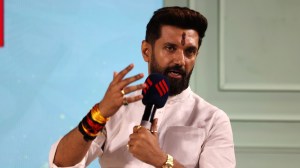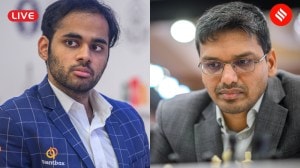IT RUNS IN THE FAMILY
The latest Davis Cup crisis is not an isolated case in Indian tennis history. But it’s never been quite so bad, writes Shreya Chakravertty in an analysis of a sport that has been ruled by households rather than a federation

When the Beatles sang Come Together, they weren’t talking about the Indian Davis Cup team. The song should, perhaps, be played in the dressing room more often than it is.
Memories of India’s tennis contest always bring to mind evocative images, conjured up by racquets and the magicians who wielded them.
Way back in 1921, the Indian story got off to a fairytale start with a French conquest to reach the semi-finals. There may have been no tecnhicolour back then to capture the moment, but it put into motion an incredible journey that traversed three finals and numerous unforgettable victories.
The flag fluttered proudly those few weekends a year.
When did it all start going wrong? How did things come to such an ugly pass, as they have this past week?
The happy-Davis Cup-family act may have been perfected but, over the last 12 months, the smiles have hidden tensions and travails. It could be a simple clash of personalities — heart-on-his-sleeve Leander versus always-in-the-shadow Mahesh. Or it could be that Paes the captain was being Paes the dictator, and the juniors in the team couldn’t take it anymore. Or is it, as it has been historically in Indian tennis, just a clash of families?
FAMILY VALUES
First there were the Krishnans — Ramanathan was Indian tennis’s first superstar. He rubbed shoulders with the likes of Neale Fraser, Rod Laver and Lew Hoad, made the Wimbledon semi-finals twice. He passed on his touch tennis to son, Ramesh, who remained consistently among the top 30 players in the world at his prime and became a Davis Cup legend just like his dad.
But the Krishnans can’t claim to be Indian tennis’s first family without debate. Sandwiched between father and son, was the era of the Amritrajs. Vijay, the elder brother, was so promising in his early years that he was once labeled a part of the ABC of tennis — along with Bjorn Borg and Jimmy Connors. Honed on courts in his backyard, with brother Anand, he formed one of India’s best Davis Cup teams in history. Once Ramesh Krishnan had joined the squad, the sport scaled new heights.
In the modern era, there has been Leander Paes followed by Mahesh Bhupathi. Together they were a doubles pair that has set records that will be hard to beat, even if the bonhomie lasted only for a few seasons. They may not have scaled the Davis Cup heights of previous generations but managed to win crucial matches — Leander in particular — to be synonymous with Indian tennis in the late 90s and early 2000s. At the same time, their fathers — Dr Vece Paes, himself a former hockey Olympian, and CGK Bhupathi, who took it upon himself to make his son an international tennis player while working in the Middle-East — grew in stature in Indian tennis circles.
Right though this 40-year progression, while Indian tennis grew despite the system rather than because of it, it has been these families that can be credited for India’s Davis Cup success. All the while, however, there has been simmering resentment between the households.
NEVER SO BAD
When Ramesh started finding his feet in the big league, Ramanathan was not in agreement with the way Vijay Amritraj, by then the Davis Cup captain, treated his son. There was a sustained battle between the two families, as a result, but never in history have things become so ugly as in the last week when Bhupathi, Vijay’s son Prakash Amritraj and Rohan Bopanna shot off an email to AITA saying they would not play for India if Paes was retained as skipper.
“Krishnan and Amritraj did have problems with each other, but the country comes before any personality clash, and they both realised that,” says former Davis Cupper Akhtar Ali, whose son Zeeshan also represented India.
“Personal opinions don’t matter in a team sport. Kapil Dev and Sunil Gavaskar couldn’t stand each other, but that’s not what was important. When Amritraj dropped Krishnan in favour of Shashi Menon for a tie, nobody ever said they won’t play for the country again. Bhupathi had said before that he won’t play the zonal Davis Cup ties, Bopanna made himself unavailable for a tie last year, but nobody really made a big deal about it. When Sania says she won’t play in India, such a big hue and cry was made. But even she didn’t say she won’t play for the country like these players did.”
WHAT HAPPENED NOW?
“Unprofessional” — that was what captain Leander Paes branded Prakash after dropping him for day one of the Uzbekistan tie. A mud-slinging match began, this time in the open, with viewers watching the competition as keenly as they would if it was a classic fifth rubber. Bhupathi says the AITA leaked the letter to the media, the AITA refuses to comment, and numerous speculations abound.
The tussle threatens to crack the establishment down the middle. The divided camps are on the edge, and once they fall through the gaping chasm, only one loser will be revealed — Indian tennis. Especially at a time when the players in question are not ranked consistently in the top-50 as Vijay and Ramesh were, but are lurking somewhere in the 200s.
There has been some tension as far as Paes and Davis Cup is concerned. But nothing was brought out into the open so vocally, not even when he had questioned Bhupathi’s commitment during the Asian Games in Doha in 2006. What is so significant this time around? Could it be because the player involved answered to the name Amritraj?
Akhtar Ali agrees. “When Prakash was dropped for the first tie, that’s when the trouble started,” he says. “If they had problems with Leander earlier, why didn’t they say so? This time it was Prakash who was dropped, and Vijay must not have been too happy about that.”
It’s true that the e-mail which started it all could have been shot off in the past. Paes has been alleged to have undermined player confidence several times before. But the voice of dissent grew louder with the strength of Amritraj senior behind it, and now, reinforcement has arrived in the form of Bhupathi. In the mess that it has become, it’s not clear whose fight this really is.
MAHESH’S BOYS?
Leander’s record while playing for the country has been harped upon, but when it comes to man management, he has always walked two steps behind Bhupathi. This is reflected in the success of his company Globosport in contrast to the fading away of Leander’s Paes-en-Sport. Charges of rubbing his players the wrong way are a frequent occurrence for Paes, and the alleging camp usually has Bhupathi putting an arm around its shoulder. Bopanna, who was training at the CGK Bhupathi tennis village, was not played for the 2002 Davis Cup tie against a weak Lebanon side, with Paes picking Harsh Mankad instead. This time, it’s Prakash who has accused Paes of “butchering” him, and one of the parties who signed the letter of revolt is Bhupathi himself.
“The new crop is coming up, and the old is gradually fading away. Differences arise,” says Sumant Misra, another Davis Cup veteran and Ramanathan’s contemporary. “When I was playing, there were some issues within the team, but nothing like this. Human nature is such that strong personalities will clash and people will get carried away. We played most of our ties away from home, and it’s not like the press were following us around. Even if there were occasional tensions, they did not get reported like it is happening now,” he adds.
“At the end of the day, it is the captain who has to decide whether a player is fit or not. In this case also — If you have a stomach upset — then it’s the captain’s decision whether you should play or not. Paes has created a reputation in fighting for the country, and for these players to come out and say what they did is jumping the gun. How can they say they won’t play under the captain? Can any cricketer say we won’t play under Dhoni? The AITA should pick a captain and say, keep out if you want.”
COUNTER ARGUMENT
While Ramanathan prefers to keep away from the current controversy, Jaidip Mukerjea, who recently revealed his own issues with Paes, insists there can be no smoke without fire. “This is the first time in the history of Indian sport that something like this has happened. The boys must have had some serious problems for it to come to this,” he says.
“I was captain from ‘94 to ‘99 and we had great results. It was I who made Leander and Mahesh play together. But then Leander told AITA that he didn’t want me as captain. I told RK Khanna (then AITA chief) that I know about what he had said, and I wanted to put in my papers. There is no doubt that Leander is a great player, but Rohan and Prakash are the future. The captain has to protect his team — he shouldn’t have announced to the media the things he said about Prakash. Look at Doha, and what Leander said then about Mahesh. He keeps making statements that he should not.”
The disgruntled bunch insists they have no trouble with Paes as a player, it’s just his captaincy that bothers them. And though the AITA has decided to stick with Paes for the Japan tie, it isn’t like his removal from captaincy will be the end of all trouble. The past misgivings will not be erased by assigning Paes a player’s role. The tension will continue to prevail. The AITA has deferred a clear decision till the Olympics, but the current standoff threatens to swallow everything in its wake, including the Leander-Mahesh swansong this year’s Olympic Games were supposed to be.
Whoever wins this battle, the war has already been lost.


- 01
- 02
- 03
- 04
- 05





























